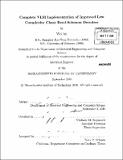Complete VLSI implementation of improved low complexity chase Reed-Solomon decoders
Author(s)
An, Wei (Scientist in electrical engineering) Massachusetts Institute of Technology
DownloadFull printable version (9.553Mb)
Alternative title
Complete VLSI implementation of improved LCC RS decoders
Complete very large scale integration implementation of improved low complexity chase Reed-Solomon decoders
Other Contributors
Massachusetts Institute of Technology. Dept. of Electrical Engineering and Computer Science.
Advisor
Vladimir M. Stojanović.
Terms of use
Metadata
Show full item recordAbstract
This thesis presents a complete VLSI design of improved low complexity chase (LCC) decoders for Reed-Solomon (RS) codes. This is the first attempt in published research that implements LCC decoders at the circuit level. Based on the joint algorithm research with University of Hawaii, we propose several new techniques for complexity reduction in LCC decoders and apply them in the VLSI design for RS [255, 239,17] (LCC255) and RS [31, 25, 7] (LCC31) codes. The major algorithm improvement is that the interpolation is performed over a subset of test vectors to avoid redundant decoding. Also the factorization formula is reshaped to avoid large computation complexity overlooked in previous research. To maintain the effectiveness of algorithm improvements, we find it necessary to adopt the systematic message encoding, instead of the evaluation-map encoding used in the previous work on interpolation decoders. The LCC255 and LCC31 decoders are both implemented in 90nm CMOS process with the areas of 1.01mm 2 and 0.255mm 2 respectively. Simulations show that with 1.2V supply voltage they can achieve the energy efficiencies of 67pJ/bit and 34pJ/bit at the maximum throughputs of 2.5Gbps and 1.3Gbps respectively. The proposed algorithm changes, combined with optimized macro- and micro-architectures, result in a 70% complexity reduction (measured with gate count). This new LCC design also achieves 17x better energy-efficiency than a standard Chase decoder (projected from the most recent reported Reed Solomon decoder implementation) for equivalent area, latency and throughput. The comparison of the two decoders links the significantly higher decoding energy cost to the better decoding performance. We quantitatively compute the cost of the decoding gain as the adjusted area of LCC255 being 7.5 times more than LCC31.
Description
Thesis (Elec. E.)--Massachusetts Institute of Technology, Dept. of Electrical Engineering and Computer Science, 2010. Cataloged from PDF version of thesis. Includes bibliographical references (p. 95-97).
Date issued
2010Department
Massachusetts Institute of Technology. Department of Electrical Engineering and Computer SciencePublisher
Massachusetts Institute of Technology
Keywords
Electrical Engineering and Computer Science.